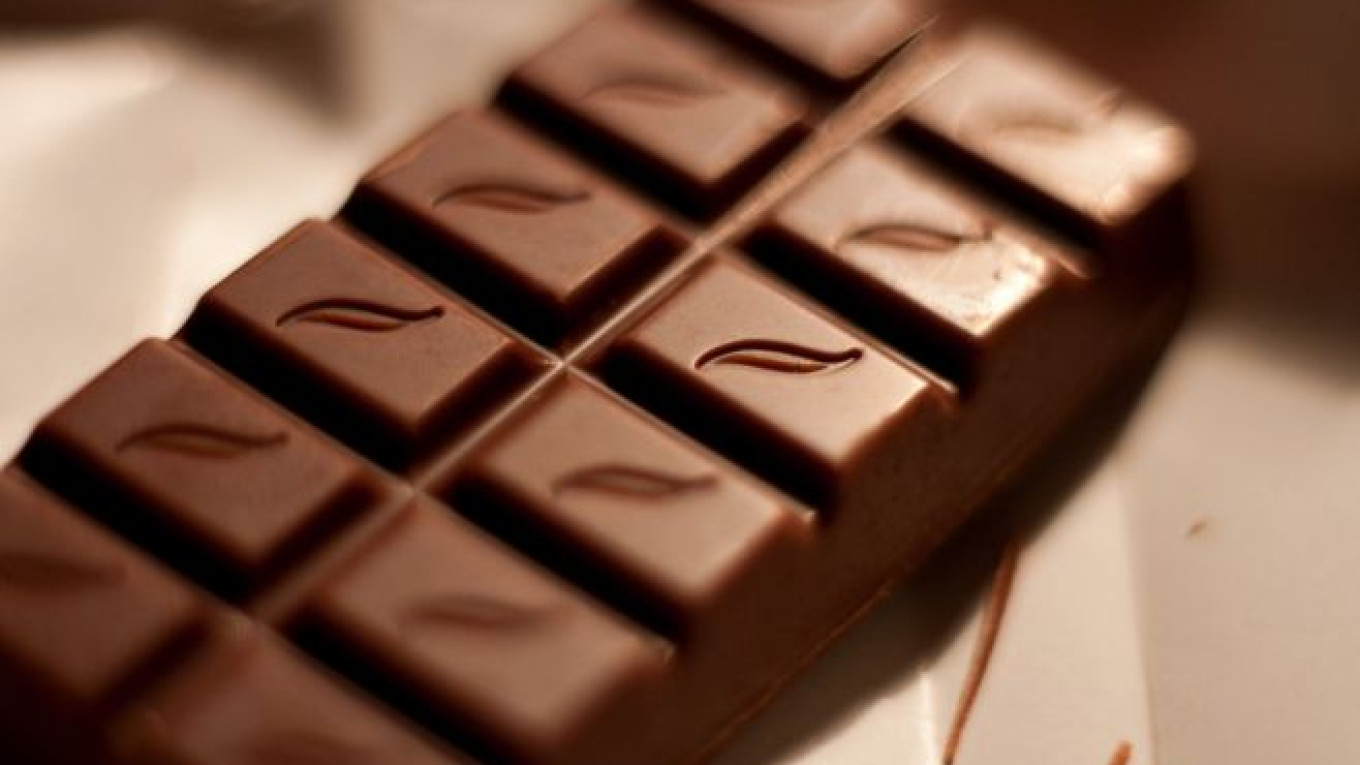Rather than turning to chocolate for consolation in these tough economic times, Russians are eating less and less of the classic comfort food as crises at home and abroad send prices skyrocketing.
As Russian economic growth screeched to a halt last year, per capita chocolate consumption fell from 4.36 kilograms per year in 2013 to 4.15 kilograms in 2014 — a 5 percent drop, according to the Center for Market Research, which studies Russia's candy and chocolate markets.
Altogether, the volume of chocolate and other cocoa-containing candy consumed in Russia fell 4.8 percent last year, the center said in a recent report.
The drop came as Russia stumbled into an economic crisis brought on by falling oil prices and Western sanctions leveled against Moscow in response to its actions in Ukraine. The drop in oil prices has sent the ruble currency down nearly 40 percent against the U.S. dollar since this time last year, fueling price inflation and dealing a blow to real wages and retail spending.
Russians' real wages fell 13.3 percent year-on-year in April, according to state statistics service Rosstat, sending retail sales — a key engine of the Russian economy — down 9.8 percent.
The fall in chocolate consumption brings Russia even further behind Western European countries. The average German ate 12.2 kilograms of chocolate last year, according to the Center for Market Research — nearly three times the per capita consumption in Russia.
The drop is already taking its toll on chocolate producers: Russian production of chocolate and chocolate goods fell 10 percent in the first quarter of this year compared to the same period in 2014, according to Vyacheslav Lashmankin, executive director of confectionary industry association ASKOND.
"Today, companies that work in the chocolate and chocolate goods segment are truly working in very challenging conditions and need, among other things, government support," Lashmankin said.
Consumption of chocolate and candy containing cocoa could fall a further 4 percent this year to 4 kilograms per capita, according to the Center for Market Research — a trend that would have dire consequences for some parts of the industry.
"A possible, more dramatic fall in demand for chocolate will first of all hit midsize and small regional factories, which are the most oriented on local production and essentially do not export their products," said Yelizaveta Nikitina, the center's executive director.
Chocolatiers have been struck by market turmoil both within Russia and without. The cost of imported ingredients has climbed along with the devaluation of the ruble, while a gradual global rise in the cost of cocoa was exacerbated this year by a drought in West Africa, which produces more than 70 percent of the world's cocoa.
Cocoa beans that cost $3,008 per ton in 2013 now cost $3,501 per ton — a 16 percent rise, Lashmankin said.
All told, the retail price of chocolate in Russia soared 32 percent year-on-year to 666 rubles ($12.30) per kilogram in May, up from 504 rubles ($9.30) in the same period last year, according to data from state statistics service Rosstat.
The headlong rise in the cost of chocolate far exceeded overall food price inflation. Food prices were on average 20.2 percent higher in May than a year earlier, Rosstat said.
As a result, Russian consumers, whose spending power has dropped as inflation climbs, are turning to cheaper brands and other products altogether.
"Chocolate is overall losing volume to other confectionary products," said Andrei Sychyov, client service group director at market research company GfK in Russia.
One chocolate producer contacted by The Moscow Times, the Moscow region-based factory Pobeda, said it hadn't seen a drop in chocolate consumption, but admitted that buying trends were clearly shifting.
Customers are increasingly choosing budget chocolate and retailers' house brands, which tend to be cheaper and contain less cocoa, Pobeda's president Vitaly Muravyov said.
These shifts in the chocolate market reflect the broader effect of the current economic crisis on fast-moving consumer goods in Russia, GfK's Sychyov said.
"In a number of categories, the share of the cheapest and most expensive price segments are growing and the middle is suffering," he said.
Contact the author at d.damora@imedia.ru


